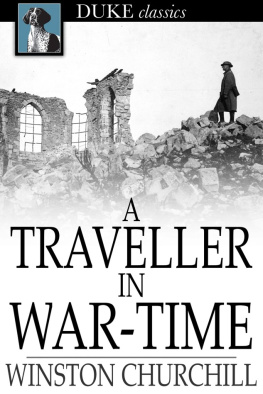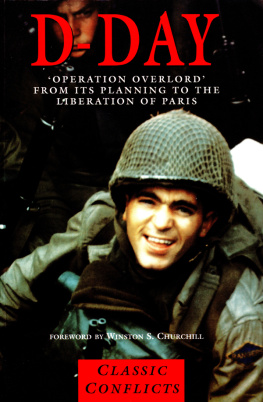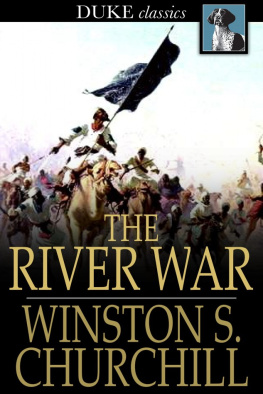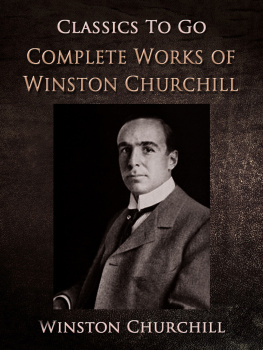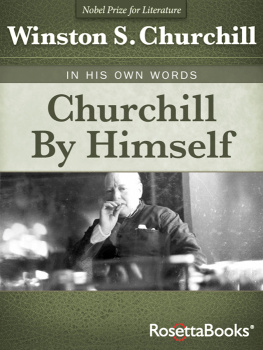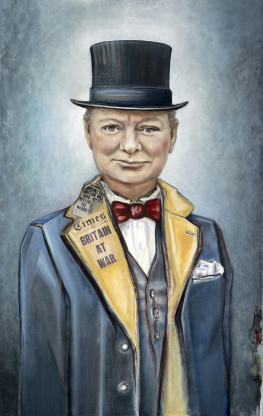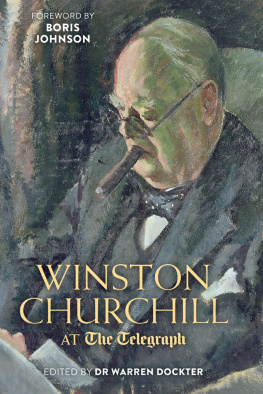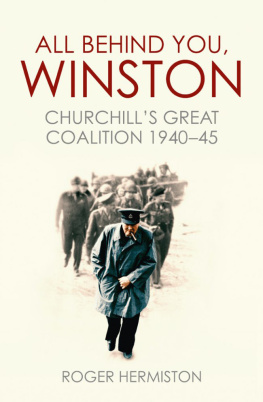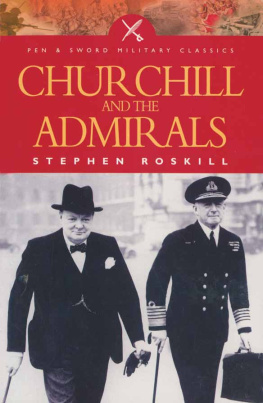Winston Churchill - A Traveller in War-Time
Here you can read online Winston Churchill - A Traveller in War-Time full text of the book (entire story) in english for free. Download pdf and epub, get meaning, cover and reviews about this ebook. year: 2015, publisher: Duke Classics, genre: Art. Description of the work, (preface) as well as reviews are available. Best literature library LitArk.com created for fans of good reading and offers a wide selection of genres:
Romance novel
Science fiction
Adventure
Detective
Science
History
Home and family
Prose
Art
Politics
Computer
Non-fiction
Religion
Business
Children
Humor
Choose a favorite category and find really read worthwhile books. Enjoy immersion in the world of imagination, feel the emotions of the characters or learn something new for yourself, make an fascinating discovery.
- Book:A Traveller in War-Time
- Author:
- Publisher:Duke Classics
- Genre:
- Year:2015
- Rating:3 / 5
- Favourites:Add to favourites
- Your mark:
- 60
- 1
- 2
- 3
- 4
- 5
A Traveller in War-Time: summary, description and annotation
We offer to read an annotation, description, summary or preface (depends on what the author of the book "A Traveller in War-Time" wrote himself). If you haven't found the necessary information about the book — write in the comments, we will try to find it.
The American novelist Winston Churchill (not to be confused with the British prime minister of the same name) was one of the most popular fiction writers of the early twentieth century. With World War I looming, Churchill took a break from imaginative work and traveled extensively in Europe. A Traveller in War-Time is a compelling document of his experiences and observations.
A Traveller in War-Time — read online for free the complete book (whole text) full work
Below is the text of the book, divided by pages. System saving the place of the last page read, allows you to conveniently read the book "A Traveller in War-Time" online for free, without having to search again every time where you left off. Put a bookmark, and you can go to the page where you finished reading at any time.
Font size:
Interval:
Bookmark:

First published in 1918
ISBN 978-1-63421-445-2
Duke Classics
2015 Duke Classics and its licensors. All rights reserved.
While every effort has been used to ensure the accuracy and reliability of the information contained in this edition, Duke Classics does not assume liability or responsibility for any errors or omissions in this book. Duke Classics does not accept responsibility for loss suffered as a result of reliance upon the accuracy or currency of information contained in this book.
I am reprinting here, in response to requests, certain recentexperiences in Great Britain and France. These were selected in the hopeof conveying to American readers some idea of the atmosphere, of "whatit is like" in these countries under the immediate shadow of the battleclouds. It was what I myself most wished to know. My idea was first tosend home my impressions while they were fresh, and to refrain as far aspossible from comment and judgment until I should have had time to makea fuller survey. Hence I chose as a title for these articles,intendedto be preliminary, "A Traveller in War-Time." I tried to banish from mymind all previous impressions gained from reading. I wished to be freefor the moment to accept and record the chance invitation or adventure,wherever met with, at the Front, in the streets of Paris, in Ireland, oron the London omnibus. Later on, I hoped to write a book summarizing thechanging social conditions as I had found them.
Unfortunately for me, my stay was unexpectedly cut short. I was ableto avail myself of but few of the many opportunities offered. With thisapology, the articles are presented as they were written.
I have given the impression that at the time of my visit there was nolack of food in England, but I fear that I have not done justice to thefrugality of the people, much of which was self-imposed for the purposeof helping to win the war. On very, good authority I have been givento understand that food was less abundant during the winter just past;partly because of the effect of the severe weather on our Americanrailroads, which had trouble in getting supplies to the coast, andpartly because more and more ships were required for transportingAmerican troops and supplies for these troops, to France. Thisadditional curtailment was most felt by families of small income, whoseearners were at the front or away on other government service. Mothershad great difficulty in getting adequate nourishment for growingchildren. But the British people cheerfully submitted to this furtherdeprivation. Summer is at hand. It is to be hoped that before anotherwinter sets in, American and British shipping will have sufficientlyincreased to remedy the situation.
In regard to what I have said of the British army, I was profoundlystruck, as were other visitors to that front, by the health andmorale of the men, by the marvel of organization accomplished in socomparatively brief a time. It was one of the many proofs of the extentto which the British nation had been socialized. When one thought ofthat little band of regulars sent to France in 1914, who became immortalat Mons, who shared the glory of the Marne, and in that first dreadfulwinter held back the German hosts from the Channel ports, the presenceon the battle line of millions of disciplined and determined men seemedastonishing indeed. And this had been accomplished by a nation facingthe gravest crisis in its history, under the necessity of sustaining andfinancing many allies and of protecting an Empire. Since my return toAmerica a serious reverse has occurred.
After the Russian peace, the Germans attempted to overwhelm the Britishby hurling against them vastly superior numbers of highly trained men.It is for the military critic of the future to analyse any tacticalerrors that may have been made at the second battle of the Somme.Apparently there was an absence of preparation, of specific orders fromhigh sources in the event of having to cede ground. This much can besaid, that the morale of the British Army remains unimpaired; that thepresence of mind and ability of the great majority of the officerswho, flung on their own resources, conducted the retreat, cannot bequestioned; while the accomplishment of General Carey, in stopping thegap with an improvised force of non-combatants, will go down in history.In an attempt to bring home to myself, as well as to my readers, arealization of what American participation in this war means or shouldmean.
Toward the end of the summer of 1917 it was very hot in New York, andhotter still aboard the transatlantic liner thrust between the piers.One glance at our cabins, at the crowded decks and dining-room, at thelittle writing-room above, where the ink had congealed in the ink-wells,sufficed to bring home to us that the days of luxurious sea travel, of ala carte restaurants, and Louis Seize bedrooms were goneat least fora period. The prospect of a voyage of nearly two weeks was not enticing.The ship, to be sure, was far from being the best of those stillrunning on a line which had gained a magic reputation of immunity fromsubmarines; three years ago she carried only second and third classpassengers! But most of us were in a hurry to get to the countrieswhere war had already become a grim and terrible reality. In one way oranother we had all enlisted.
By "we" I mean the American passengers. The first welcome discoveryamong the crowd wandering aimlessly and somewhat disconsolately aboutthe decks was the cheerful face of a friend whom at first I did notrecognize because of his amazing disguise in uniform. Hitherto he hadbeen associated in my mind with dinner parties and clubs.
That life was past. He had laid up his yacht and joined the Red Crossand, henceforth, for an indeterminable period, he was to abide amidstthe discomforts and dangers of the Western Front, with five days' leaveevery three months. The members of a group similarly attired whom Ifound gathered by the after-rail were likewise cheerful. Two well-knownspecialists from the Massachusetts General Hospital made significantthe hegira now taking place that threatens to leave our country, likeBritain, almost doctorless. When I reached France it seemed to me that Imet all the celebrated medical men I ever heard of. A third in the groupwas a business man from the Middle West who had wound up his affairs andleft a startled family in charge of a trust company. Though his physicalactivities had hitherto consisted of an occasional mild game of golf,he wore his khaki like an old campaigner; and he seemed undaunted bythe prospectstill somewhat remotely ahead of himof a winter journeyacross the Albanian Mountains from the Aegean to the Adriatic.
After a restless night, we sailed away in the hot dawn of a Wednesday.The shores of America faded behind us, and as the days went by, we hadthe odd sense of threading uncharted seas; we found it more and moredifficult to believe that this empty, lonesome ocean was the Atlanticin the twentieth century. Once we saw a four-master; once a shy, silentsteamer avoided us, westward bound; and once in mid-ocean, tossed on asea sun-silvered under a rack of clouds, we overtook a gallant littleschooner out of New Bedford or Gloucestera forthfarer, too.
Meanwhile, amongst the Americans, the socializing process had begun.Many elements which in a former stratified existence would never havebeen brought into contact were fusing by the pressure of a purpose, ofa great adventure common to us all. On the upper deck, high above thewaves, was a little 'fumoir' which, by some odd trick of association,reminded me of the villa formerly occupied by the Kaiser inCorfuperhaps because of the faience plaques set in the wallsalthoughI cannot now recall whether the villa has faience plaques or not. Theroom was, of course, on the order of a French provincial cafe, and assuch delighted the bourgeoisie monopolizing the alcove tables and jokingwith the fat steward. Here in this 'fumoir', lawyers, doctors, businessmen of all descriptions, newspaper correspondents, movie photographers,and millionaires who had never crossed save in a 'cabine de luxe',rubbed elbows and exchanged views and played bridge together. There wereY. M. C. A. people on their way to the various camps, reconstructionworkers intending to build temporary homes for the homeless French, andyoungsters in the uniform of the American Field Service, going over todrive camions and ambulances; many of whom, without undue regret,had left college after a freshman year. They invaded the 'fumoir',undaunted, to practise atrocious French on the phlegmatic steward; theytook possession of a protesting piano in the banal little salon andsang: "We'll not come back till it's over over there." And in theevening, on the darkened decks, we listened and thrilled to the refrain:
Font size:
Interval:
Bookmark:
Similar books «A Traveller in War-Time»
Look at similar books to A Traveller in War-Time. We have selected literature similar in name and meaning in the hope of providing readers with more options to find new, interesting, not yet read works.
Discussion, reviews of the book A Traveller in War-Time and just readers' own opinions. Leave your comments, write what you think about the work, its meaning or the main characters. Specify what exactly you liked and what you didn't like, and why you think so.

